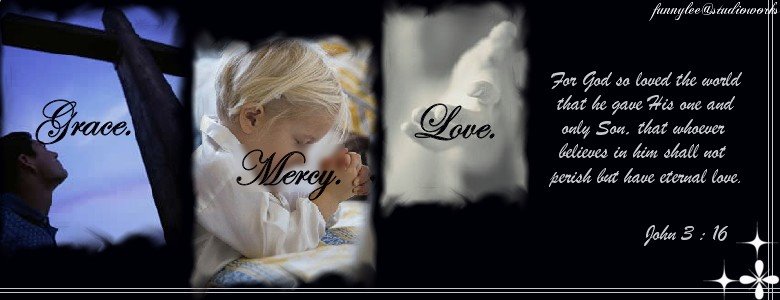It hits some of my questions spot on, and so I don't mind typing it all out...
if u guys don't mind reading it of course ;)
No Fixed Formula
Even after spelling out some of what we do wrong in our prayers, however-especially after spelling that out-I must repeat that prayer does not work according to a fixed formula: get your life in order, say the right words, and the desired result will come. If that were true, Job would have avoided much suffering, Paul would have shed his thorn in the flesh, and Jesus would never have gone to Golgotha. Between the two questions "Does God answer prayer?" and "Will God grant my specific prayer for this sick child or this particular injustice?" lies a great pool of mystery.
Charles Edward White, a college professor in the state of Michigan spent several terms as a visiting professor at the University of Jos in Nigeria. While there, he visited a missionary graveyard in a quiet garden beside a chapel on Nigeria's Central Plateau. Most of the graves he noticed were small: two and three-foot mounds to accommodate child-sized coffins. 33 of the 56 graves in fact held the bodies of small children.....
...Two infants lived just one day. Others lived a few years, falling victim to the tropical diseases common in that part of the world. Melvin Louis Goossen was twelve when he and his brother fell off a suspension bridge over a rain swollen creek. Their missionary father, Arthur Goossen dived in the creek to save one son. But when he dived after Melvin, both father and son drowned....
...."The graveyard at Miango tells us something about God and about His grace. It testifies that God is not a jolly grandfather who satisfies our every desire. Certainly those parents wanted their children to live. They plead with God but He denied their request.
The graves also show us that God is not a calculating merchant who withholds his goods until we produce enough good works or faith to buy his help. If anyone had earned credit with God, it would have been these missionaries. They left all to spread the gospel in a hostile environment, But God does not hand out merit pay.
Not only do we learn about God's nature from the Miango graveyard, but we also discover truths about God's grace. God's grace may be free, but it is not cheap. Neither purchasing our salvation nor letting us know the gift was inexpensive.
Beginning with Abel, many of the witnesses to divine grace sealed their words with blood. Jesus asked the Jews which of the prophets was not persecuted? When he first sent out his disciples, he promised them betrayal and death. Then, at the end of his ministry, he promised his followers that as they carried out his word, they would face trouble and hatred.."
"The only way we can understand the graveyard at Miango," White concluded, "is to remember that God also buried his Son on the mission field."
For a missionary couple who stand beside a mound of earth in a garden in Nigeria, no logical explanation of unanswered prayer will suffice. They must place their faith in a God who has yet to fulfill the promise that good will overcome evil, that God's good purpose will, in the end, prevail. To cling to that belief may represent the ultimate rationalization----or the ultimate act of faith.
(pg 230-231, Prayer: Does it make a difference, P. Yancey)
Even after spelling out some of what we do wrong in our prayers, however-especially after spelling that out-I must repeat that prayer does not work according to a fixed formula: get your life in order, say the right words, and the desired result will come. If that were true, Job would have avoided much suffering, Paul would have shed his thorn in the flesh, and Jesus would never have gone to Golgotha. Between the two questions "Does God answer prayer?" and "Will God grant my specific prayer for this sick child or this particular injustice?" lies a great pool of mystery.
Charles Edward White, a college professor in the state of Michigan spent several terms as a visiting professor at the University of Jos in Nigeria. While there, he visited a missionary graveyard in a quiet garden beside a chapel on Nigeria's Central Plateau. Most of the graves he noticed were small: two and three-foot mounds to accommodate child-sized coffins. 33 of the 56 graves in fact held the bodies of small children.....
...Two infants lived just one day. Others lived a few years, falling victim to the tropical diseases common in that part of the world. Melvin Louis Goossen was twelve when he and his brother fell off a suspension bridge over a rain swollen creek. Their missionary father, Arthur Goossen dived in the creek to save one son. But when he dived after Melvin, both father and son drowned....
...."The graveyard at Miango tells us something about God and about His grace. It testifies that God is not a jolly grandfather who satisfies our every desire. Certainly those parents wanted their children to live. They plead with God but He denied their request.
The graves also show us that God is not a calculating merchant who withholds his goods until we produce enough good works or faith to buy his help. If anyone had earned credit with God, it would have been these missionaries. They left all to spread the gospel in a hostile environment, But God does not hand out merit pay.
Not only do we learn about God's nature from the Miango graveyard, but we also discover truths about God's grace. God's grace may be free, but it is not cheap. Neither purchasing our salvation nor letting us know the gift was inexpensive.
Beginning with Abel, many of the witnesses to divine grace sealed their words with blood. Jesus asked the Jews which of the prophets was not persecuted? When he first sent out his disciples, he promised them betrayal and death. Then, at the end of his ministry, he promised his followers that as they carried out his word, they would face trouble and hatred.."
"The only way we can understand the graveyard at Miango," White concluded, "is to remember that God also buried his Son on the mission field."
For a missionary couple who stand beside a mound of earth in a garden in Nigeria, no logical explanation of unanswered prayer will suffice. They must place their faith in a God who has yet to fulfill the promise that good will overcome evil, that God's good purpose will, in the end, prevail. To cling to that belief may represent the ultimate rationalization----or the ultimate act of faith.
(pg 230-231, Prayer: Does it make a difference, P. Yancey)


No comments:
Post a Comment